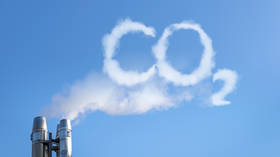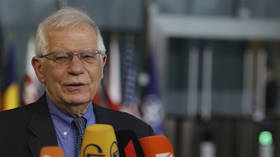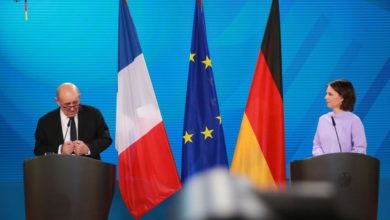What will happen if the West really abandons Russian gas? — Analysis

Lithuania declared that on April 2 it would be the EU’s first country to completely stop using Russian gas. The announcement was made amidst Moscow’s ongoing military assault in Ukraine and came after the Kremlin announced a new payment procedure for countries deemed “unfriendly.”
Importers from EU countries will need to create a Gazprombank account, which they can then lodge their payments. Moscow states that the new measures are needed due to its inability to trust dollars and euros because of sanctions.
But, it’s not clear if the European Union can agree on whether it would be realistic to place an embargo total on Russian gas imports. It wouldn’t apply to all members of the bloc. Poland claims it’s ready to follow Lithuania’s path. Its government representative on strategic energy and infrastructure issues, Peter Naimsky, has already announced that Warsaw will stop buying gas from Russia after 2022.
But, the Czech Republic and Slovakia are not likely to be willing to make such drastic decisions. The head of the Slovak Ministry of Economy, Richard Sulik, said his country can’t do without Russian gas supplies, so Moscow’s condition for payment in rubles must be respected. He pointed out that Slovakia currently purchases about 85% from the Russian Federation and it would take many years for it to cease buying Russian gas.
“We cannot be cut off from gas,”The Slovak minister stated it bluntly. Prague admitted, too that it would take its gas reserves no more than 34 days to run out.
France and Germany have taken a position somewhere in between – Germany’s Finance Ministry gave assurances that a plan was being jointly worked out to prepare for a possible termination of Russian gas supplies. But Chancellor Olaf Scholz admitted the obvious, stating that, while Germany will “probably eliminate” its dependence on Russian oil and coal within a year, this won’t include gas imports.

“This is not a game, but a scenario that needs to be taken very seriously, as it can potentially create deep divisions in the economy and society. From my point of view, it was correct not to immediately start the process of terminating relations with respect to supplies,”Robert Habeck, German Vice-Chancellor, stated the following:
RT spoke to experts about what a sudden halt in Russian gas supply might mean for Europe.
EU won’t freeze until it gets cold
The bloc consumes a total of 400 billion m3 of gas per year, about 40-45%, or 150 billion m3, of which is supplied by Russia. The dependence is mutual. Russia exported 200 Billion m3 gas in 2021. 75% of this export went to Europe.
Experts believe that gas supplies will be cut off now in order to avoid severe consequences for Western European countries later this summer and early fall. The reason is that the current heating season, which began at the beginning April, is almost over. Any current energy needs can be satisfied by the stocks already stored in the storage facility.
Marcel Salikhov, director of economics at the Higher School of Economics’ Institute of Energy and Finance, told RT that gas consumption strongly fluctuates depending on the season.
“During the heating season, autumn and winter, gas consumption sharply rises everywhere in Russia and the EU. However, gas demand is declining. And if we hypothetically imagine that gas supplies stopped immediately, the EU would be able to survive until the end of summer or early autumn due to its own production and the import of liquefied natural gas (LNG). The problem with this scenario is that the gas won’t be stored in storage, so the question of what to do when the next heating season begins will remain. Although the EU will have some time to intensively search for alternatives,”He stated.
According to Salikhov, the current system makes it impossible for EU nations to heat their homes in winter without Russian Gas.
However, some countries like Poland can forgo it. The Baltic Pipe pipeline will operate from Norway in 2022. In theory it should be able supply 10 billion m3 as much gas to Russia from now. Even though Norway may not be able complete the pipeline’s full capacity, Poland will still have the option to purchase LNG from the international market. The Polish LNG receiving terminal is located in Swinoujscie.
The cold horror
Igor Yushkov, a leading expert at the National Energy Security Fund, said in a comment to RT that if the EU stops receiving Russian gas, “there will undoubtedly be a global energy crisis.”
He described the worst scenario in which Russia would reduce production.

“What would happen if Russia couldn’t supply pipeline gas to Europe and cut production by the same amount? After all, we cannot redirect this gas anywhere, and it’s impossible to reroute gas pipelines. All the gas that remains would be even more scarce and expensive if this large volume were to leave the market. This would mean that if Poland, a country with a huge demand for gas, refused to purchase it, our production would be reduced by 10 billionm3 annually. We would then have to supply the spot market. Imagine if all 150 billion m3 of gas were taken off the market. It would be a global crisis,”He stated.
If Russian gas is largely abandoned, the EU may well face energy supply problems, as there will simply be nothing to produce electricity from, according to Yushkov. This situation may get worse if Russia stops exporting coal to EU nations as it is responsible for 70% of the EU’s supply. In that case, the energy sector would have to be managed “manually,” according to Yushkov.
“There may no longer be any trading on the spot market [a market with short-term contracts, where assets are traded and delivered immediately at actual current prices]. The trade in greenhouse gas emission limits would be stopped and completely forgotten. All available nuclear power potential (for instance, German nuclear energy plants) would again be used. It would supply electricity by the hour. It would make it extremely difficult for you to plan ahead for next heating season. You would need to cut down on the consumption of gas and ban the use air conditioners. Also, you will have to supply electricity hourly. Apartments would not be heated to 22°C, but to 10-15°C. It would be necessary to provide heat at least to the population and public facilities, like schools, nursery schools, and so on,”He described the situation as a possibility.
“But all the same, this would not be enough to replace the volumes that Russia supplied. This is especially true if Russia abruptly stops supplying coal. Because there’s no surplus gas available on the global market, we don’t have any other options. Production in the North Sea, for example, is decreasing because of depleting deposits and the fact that no one has made long-term investments. Therefore, the situation is very difficult for the Europeans,”Yushkov stated.
In fact, in February 2022, Norway’s largest gas producer, Equinox, announced that it would be unable to provide additional fuel supplies to the EU if imports from Russia ceased.
In the industrial sector, energy would become physically scarce, and the goods produced would be “very, very expensive” and uncompetitive compared to their Asian and American counterparts.

Alternative to Europe
Experts disagree that even though the EU wants to expedite the process of foregoing Russian Gas, these plans will not work in the near future.
“The EU now has a plan to reduce dependence on Russian gas that provides for a two-thirds reduction in purchases of Russian gas in 2022. This is, in my view, unrealistic. While it is quite possible to reduce imports from Russia by 20% this year, options for replacing it just don’t exist. So, measures are proposed both from the demand side, like imposing various limits, and the supply side, which include generating more electricity from coal, abandoning plans to decommission nuclear power plants, and importing additional gas, primarily American and Qatari LNG,” Salikhov explained.
Suren Kazaryan is a Senior Consultant from Big4 Consulting. In a comment to RT, he stated that, if the bloc refuses to buy Russian gas, it will inevitably be highly dependent on US LNG and their strategic energy reserves. “As a result, the EU will simply replace a cheap adjoining pipeline with expensive tankers from the other side of the world.”
According to him, gas is the only choice for European industry that uses it as their main source of raw material. “Changing production chains and putting everything on rails using LNG is not a matter of one or two years. New equipment, storage facilities, and production sequences are necessary, all of which are colossally difficult and resource-intensive.”
Kazaryan sees two options for how events may unfold in the next five years in the event of a complete EU embargo on natural gas from Russia – neutral, “with optimistic utopian overtones,”Pessimistic.
First scenario: The EU will accelerate the transition to green energy resources and start to direct funds to this end.
“This will make it possible to mitigate the losses from the embargo and give a powerful impetus to speeding up development of green energy. This can potentially lead to an influx of capital and investment and set a new trend that will allow Europe to remain a significant player in the political arena in the 21st century, which has already been dubbed ‘Asian’ in advance,”He said that he was describing the EU’s best case scenario.
There are many ‘buts’ in this scenario, among which are the EU’s unwieldy bureaucratic decision-making processes, the above-mentioned disagreements among member states due to their varying relations with Russia and dependence on its gas, the difficulty of revising preapproved EU budgets, and lack of capacity.

“Green energy is good, but we should not forget that it isn’t possible to produce the needed amount of energy with current technology,”He believes.
This pessimistic outlook foresees radical and fundamental changes in the EU. There will be higher unemployment rates from industry shut downs as well as food and energy crises.
“And, of course, a manifold increase in energy costs due to the high cost of LNG and an inadequate supply of it. Additionally, in Central and Eastern Europe there are not enough terminals and capacity for LNG storage or receipt. There is one relatively large one in Lithuania (Klaipeda), but it will not be enough for all the Baltic countries,”He notes.
Although the Lithuanian Ministry of Energy claimed that Lithuania can supply its entire energy needs through the Klaipeda LNG port, which was built in 2014 by the government of Lithuania, Ingrid Shimonite the prime minister has stated that there is not enough capacity to meet the demands of all Baltic countries.
Germany is facing a similar problem despite having reached a long-term energy cooperation agreement in March 2022 with Qatar. It provides for LNG supplies.
“This is definitely not a story for the coming year because there are no terminals in Germany capable of receiving Qatari LNG. Moreover, Doha can only supply about 15 billion m3, while supplies from Russia amount to about 60 billion m3,” Kazaryan said.
Russia: Two problems
The import economy would always be hit by an embargo of Russian gas. The main problem is that Russia doesn’t have enough developed infrastructure to compensate for the losses by redirecting its supply to other markets.
Salikhov claims that Russia will find it more challenging to handle this crisis than its rejection of oil.
“The EU is very dependent on Russian gas, but this also means that Russia is very dependent on the European market. Because our whole system of pipelines and gas flows is directed towards Europe, there are no alternatives. There’s Turkey, but it already consumes a lot of Russian gas, and it won’t necessarily be prepared to increase purchases by much.
Asian nations may be willing to purchase more gas, but it is not clear how. Only gas pipeline that connects to East is currently the Power of Siberia, China. This pipeline isn’t connected to any unified gas supply network, making it impossible for Yamal gas to be transferred to China via the existing gas pipeline system. We need to negotiate quickly with China for a Power of Siberia-2. While the concept for this already exists, it is still at the design stage and no specific agreements have been reached,”He explains.

While Kazaryan notes that China’s appetite has grown since it abandoned coal due to environmental problems, and demand from India rises every year, he agrees that, at present, it is technically difficult to increase supplies to these countries. “It is possible to build additional lines, but only with China’s help. But then it will come to the market, pour money into Gazprom’s contractors, and start supervising construction projects itself.”
Similar problems exist with LNG plants. There are only two large ones in Russia at the moment – on the Yamal Peninsula, where NOVATEK has a controlling stake, and on the Sakhalin Islands, where Gazprom has a controlling stake. They are operating at maximum capacity and there is no way to expand exports.
These plants used foreign technology that will apparently no longer be accessible to Russia. Linde AG, which is a German firm, decided to stop working on any new Russian projects and comply with EU sanctions.
Yushkov acknowledges that Russia does not have the necessary technology or equipment to create high-capacity, large-capacity LNG plants.
“Shell has built on Sakhalin, and Yamal LNG was built based on American technology. German Linde technology will be used in the construction of Arctic LNG-2. We are focusing on developing this technology rapidly. Still, we can build small-capacity LNG plants [with capacities of up to 1 million tonnes per year – RT], albeit with difficulty, and then it’s easy to scale medium-capacity LNG plants so that large volumes are obtained. Then we will continue to export LNG from these plants in order to have flexibility in choosing sales markets,”He spoke of potential opportunities.
Russia will suffer material losses in all of these situations, but the slow reorientation will mean that Russia is likely to experience tangible economic loss. Salikhov points out that even though construction of Power of Siberia-2 began today, the project will be completed in five years.
“LNG plants also take five years to build. Yes, the price of gas will rise, but if you can’t export, what difference does it make to you?”Salikhov stated.
“We would lose money anyway, and they would lose electricity and heating. Although this may not seem like the same, we have to admit that Russia is currently a net worth of $9.5 billion. Gazprom sold $9.5 billion worth of gas in January alone,”Yushkov stated.
[ad_2]





